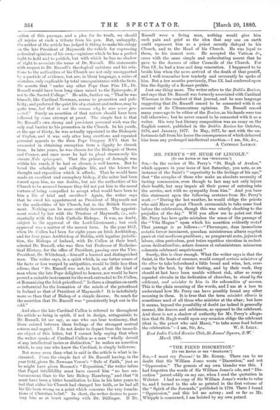MR. PERRY'S "ST. HUGH OF LINCOLN." (TO THE EDITOR OF
THE "SPECTATOR."]
Sin,—In the review of Mr. Perry's "St. Hugh of Avalon," which appears in your issue of last Saturday, you note, as an instance of the Saint's " superiority to the feelings of his age," that "the scruples of those who make an absolute necessity of fasting communion, even though to fast may not only injure their health, but may impair all their power of entering into the service, met with no sympathy from him." And you base this statement upon the following sentence from Mr. Perry's work :—" During the hot weather, he would oblige the priests who said Mass at great Church ceremonials to take some food before the celebration, though this was utterly shocking to the prejudice of the day." Will you allow me to point out that Mr. Perry has here quite mistaken the sense of the passage of the "Vita Magna" upon which his assertion evidently rests? That passage is as follows :—" Plerumque, dum immodicua wstatis fervor immineret, quosdam ministrorum altaris cogebat paths et vini modicum prwlibare ; ne prmgravati restu, jejunio et labore, citra periculum, post toties repetitos circuitus in ecelesi- arum dedicationibus, astare demum et subministrare missarum solemnia celebranti nequivissent."
Surely, this is clear enough. What the writer says is that the Saint, in the heats of summer, would compel certain ministers of the altar to take beforehand a little bread and wine, lest, over-
come by the heat, by their fasting, and by their work, they should at last have been unable without risk, after so many
repeated circuits in the dedication of churches, to stand by the celebrant, and minister to him in the solemnities of manes. This is the plain meaning of the words, and I am at a loss to understand how Mr. Perry can have possibly found any other
meaning in them. It is true that the term ministri altaris is sometimes used of all those who minister at the altar; but here
it means, beyond the possibility of doubt (as indeed it generally means), the deacon and subdeacon, as opposed to the celebrant. And there is not a shadow of authority for Mr. Perry's allega- tion that St. Hugh would upon any occasion oblige the celebrant (that is, the priest who said Mass), "to take some food before the celebration."—I am, Sir, &c., W. S. LILLY.
East India United Service Club, St. ,Tames' Square, S. W. March 18th.


































 Previous page
Previous page